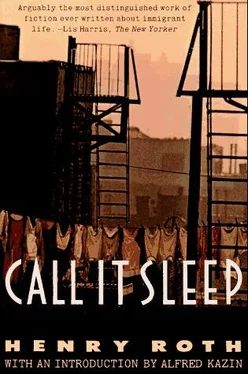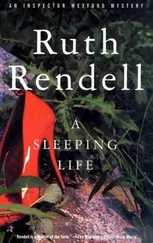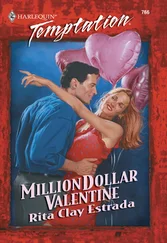“Thank you,” said his mother. “Good week.”
“Lift your head,” snapped his father. David hastily looked up. “Goodnight, Joe, I’ll see you to-morrow. Good luck.” Both men laughed.
“Good night.” Luter went out.
With a quiet sigh of relief David uncurled from the tense, inner crouch his body seemed to have assumed, and looking about saw his father gazing at the door. His face had relaxed into a bare smile.
“He’s looking for trouble,” he said dryly.
“What do you mean?”
His father uttered an amused snort. “Didn’t you notice how peculiarly he behaved tonight?”
“I did—” she hesitated, watching his face inquiringly—“at least — Why?”
He turned to her; her eyes swerved back to the dishes.
“Didn’t you notice how embarrassed he was?”
“No. Well. Perhaps.”
“Then you don’t notice very much,” he chuckled shortly. “He’s off to a marriage-broker.”
“Oh!” Her brow cleared.
“Yes. It’s a secret. You understand? You know nothing about it.”
“I understand,” she smiled faintly.
“He’s free as air, and he’s looking for a stone around his neck.”
“Perhaps he does need a wife,” she reminded him. “I mean I have often heard him say he wanted a home and children.”
“Ach, children! Fresh grief! It isn’t children he’s looking for, it’s a little money. He wants to open a shop of his own. At least that’s what he says.”
“I thought you said he was looking for troubles?” she laughed.
“Certainly! He’s hurrying things too much. If he waited a few more years he’d have enough money of his own to set up a shop — without a wife. Wait! I said to him. Wait! No, he said. I need a thousand. I want a big place four or five presses. But he’ll find out what a Yiddish thousand is. If it melts no further than five hundred the morning after he ducked under the canopy, let none call him unfortunate.” He belched quietly, the adam’s apple on his neck jogging, and then looked around with knit brows as though seeking something.
“I heard him ask you to close up the shop,” she inquired.
“Yes, he’s giving me a little overtime. I won’t be home till four or five — perhaps later. Bah!” he burst out impatiently, “The man makes eighteen dollars a week — six more than I do — and he itches to pawn himself to a wife.” He paused, looked about again—“Where’s The Tageblatt?”
His wife looked up startled. “The Tageblatt”, she repeated in dismay, “Oh, where are my wits, I’ve forgotten to buy it. The rain! I put it off.”
He scowled.
Noisily setting the dishes down in the sink, she wiped her hands on a towel. “I’ll be only a minute.”
“Where are you going?”
“My shawl.”
“What’s the matter with him, hasn’t he feet?”
“But I can do it so much more quickly.”
“That’s the whole trouble with you,” he said curtly. “You do everything for him. Let him go down.”
“But it’s wet out, Albert.”
His face darkened, “Let him go down,” he repeated. “Is it any wonder he won’t eat. He moulders in the house all day! Get your coat on.” His head jerked sharply. “Shudder when I speak to you.”
David sprang from his seat, gazed apprehensively at his mother.
“Oh,” she protested, “why do you—”
“Be still! Well?”
“Very well,” she said, annoyed yet resigned, “I’ll get him his coat.”
She brought his coat out of the bedroom and helped him into it, his father meanwhile standing above them and muttering, as he always did, that he was big enough to fetch and get into his clothes by himself. Uneasily he tried to take his rubbers from her, but she insisted on helping him.
“It’s two cents,” she gave him a dime. “Here is ten. Ask for The Tageblatt and wait till they give you change.”
“Eight cents change,” his father admonished. “And don’t forget The Tageblatt.”
As David went out, his mother trailed behind him into the hall.
“Are you going down with him too?” his father inquired.
But without making a reply, she leaned over David and whispered. “Hurry down! I’ll wait!” And aloud as if giving him the last instruction. “The candy store on the corner.”
David went down as quickly as he could. The cellar door was brown in the gaslight. The raw night air met him at the end of the doorway. He went out. Rain, seen only where it blurred the distant lamps, still fell, seeking his face and the nape of his neck with icy fingers. The candy store window glimmered near the corner. His breath an evanescent plume, he hurried toward it, splashing in hidden puddles, his toes curling down against the rising chill. The streets were frightening, seen in loneliness this way, rain-swept, dark and deserted.
He didn’t like his father. He never would like him. He hated him.
The candy store at last. He opened the door, hearing overhead the familiar tinny jangle of the bell. Gnawing a frayed chicken bone the half-grown son of the storekeeper came out of the back.
“Waddayuh want?”
“De Tageblatt.”
The boy lifted a newspaper out of a small pile on the counter, handed it to David, who having taken it, turned to go.
“Where’s your money?” demanded the boy impatiently.
“Oh, hea.” David reached up and handed over the dime that he had been clutching in his hand all this time.
Clamping the bone between his teeth the boy made change and returned it, greasy fingers greasing the coins.
He went out, hurried toward the house. Walking was too slow; his mother would be waiting. He began to run. He had only taken a few strides forward when his foot suddenly landed on something that was not pavement. The sound of hollow iron warned him too late — A coal-chute cover. He slipped. With a gasp, he teetered in air, striving, clawing for a moment at a void, and then pitched forward, sprawling in the icy slush. Money and newspaper flew from his hands and now lay scattered in the dark. Frightened, knees and stockings soaked, he pushed himself to his feet, and began wildly looking about for what he had dropped.
He found the newspaper — sopping. Then a penny. More, there was more. He peered frantically in the dark. Another penny. Two cents now. But he had eight before. He plunged his hand here, there into the numbing snow, felt along the rough pavement, retraced, groped. Further ahead! Back! Nothing. Beside the curb maybe! Nothing. He would never find it. Never! He burst into tears, ran toward the house, careless now whether he fell or not. It would be better for him if he fell now, if he were hurt. Sobbing, he entered the hallway. He heard a door open upstairs, and his mother’s voice at the top of the stairs.
“Child, I’m here.”
He climbed up.
“What is it? What is it? Why, you’re soaked through!” She led him in.
“I lost the money.” He wailed. “I only have two — two cents.”
His father was staring at him angrily, “You’ve lost it, have you? I had a feeling you would. Paid yourself for your errand, have you?”
“I fell in the snow,” he sobbed.
“It’s all right,” said his mother gently, taking the newspaper and the money away from him. “It’s all right.”
“All right? Will everything he does be all right always? How long will you tell him that?” His father snatched the paper from her. “Why, it’s wringing wet. A handy young man, my son!”
His mother took his coat off. “Come sit near the stove.”
“Indulge him! Indulge him!” her husband muttered wrathfully and flung himself into a chair. “Look at that paper!” He slapped it open on the table. “My way would be a few sound cuffs.”
“He couldn’t help it,” she interposed placatingly. “It’s very slippery and he fell.”
Читать дальше












